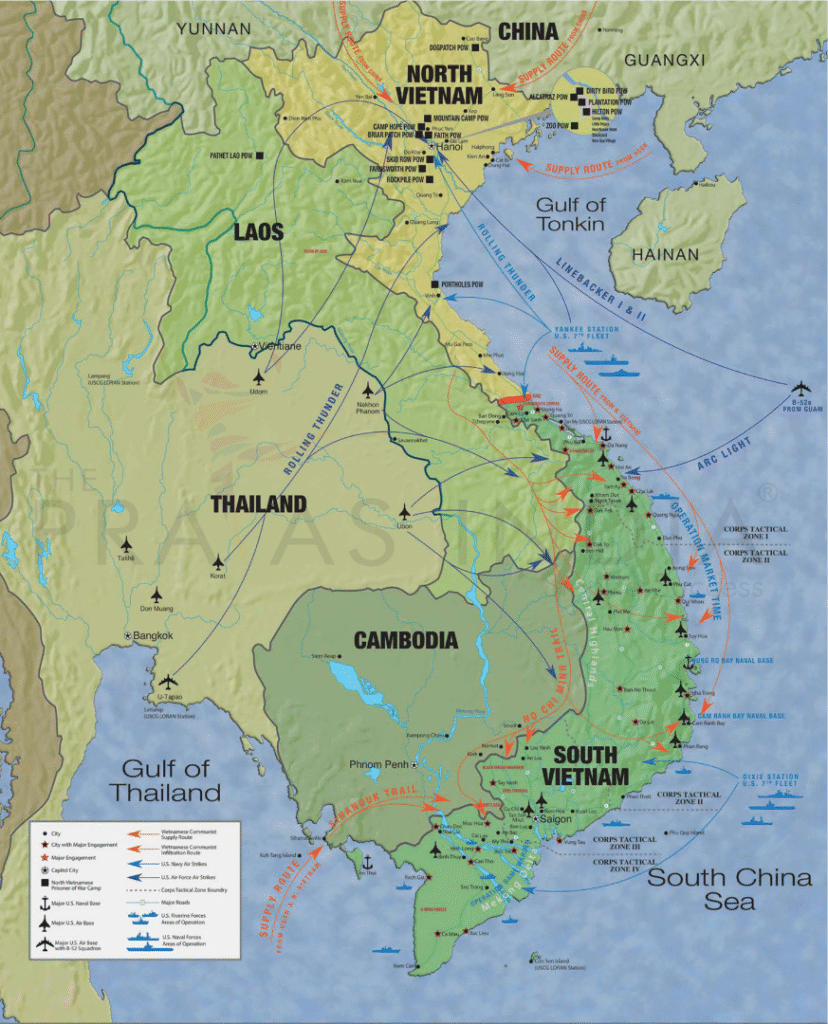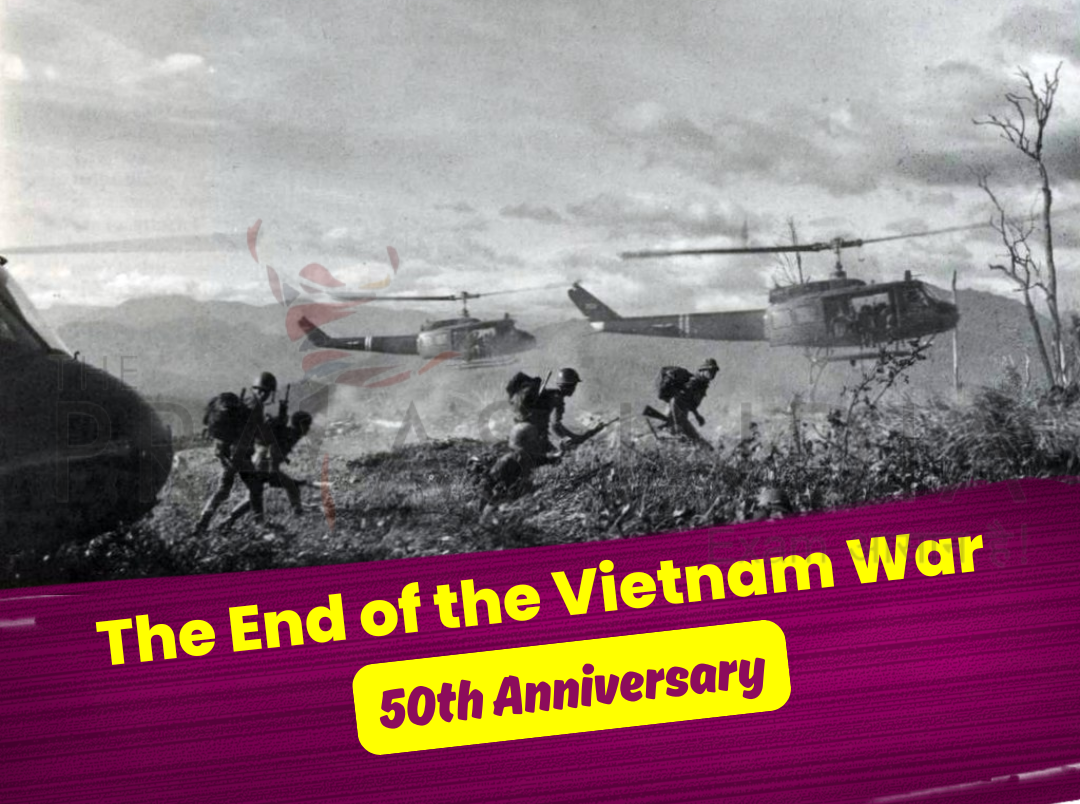The End of the Vietnam War and the 50th Anniversary: A Historic Milestone for Vietnam and the World
The Vietnam War remains one of the most defining conflicts of the 20th century, with far-reaching implications not only for Southeast Asia but also for global geopolitics, particularly during the Cold War era. In 2025, Vietnam commemorated the 50th anniversary of the end of the Vietnam War, marking five decades since the fall of Saigon and the reunification of the country. This golden jubilee was not only a reflection of Vietnam’s turbulent past but also a powerful reminder of its journey toward peace, progress, and reconciliation.
For UPSC aspirants and history enthusiasts alike, this commemoration offers an excellent opportunity to revisit the socio-political dynamics of the Vietnam War, its conclusion, and the long-term impact on Vietnam and global affairs.
Historical Context: Understanding the Vietnam War
The Vietnam War (1955–1975) was a protracted and brutal conflict between the communist North Vietnam, supported by the Soviet Union and China, and South Vietnam, backed by the United States and other anti-communist allies. At its core, the war was a battle between two ideologies—communism and capitalism—played out in a deeply divided country.
Following the First Indochina War and the 1954 Geneva Accords, Vietnam was temporarily divided at the 17th parallel. National elections intended to unify the country never occurred, and tensions escalated into a full-scale civil war that soon drew in global powers, especially the U.S., under the fear of the “domino theory” of communism.
The End of the War: Fall of Saigon in 1975
On April 30, 1975, the world watched as tanks of the North Vietnamese Army rolled into Saigon, the capital of South Vietnam. The U.S.-backed government collapsed, and American personnel and thousands of Vietnamese were evacuated in a chaotic airlift from the U.S. Embassy rooftop—a symbolic image of the end of the war. Saigon was renamed Ho Chi Minh City, marking the official reunification of Vietnam under communist rule.
The conflict had claimed more than 3 million Vietnamese lives, with untold destruction, economic hardship, and political upheaval. For the U.S., it was a humbling moment, revealing the limits of military power and prompting a reevaluation of its foreign policy strategies.
Vietnam’s 50th Anniversary Celebrations in 2025
In April 2025, Vietnam commemorated 50 years since the end of the Vietnam War, hosting national and international events to honor the occasion. The celebrations were not just a patriotic display but also a profound reflection of the country’s journey from war-torn division to a rising economic and diplomatic force in Southeast Asia.
Key Highlights of the Commemoration:
-
Grand Ceremonial Events: Held in Ho Chi Minh City, these included military parades, cultural programs, and tributes to war veterans. Leaders emphasized peace, unity, and development.
-
Historical Exhibitions: Museums across the country, especially the War Remnants Museum, showcased powerful exhibitions on the war’s legacy, including personal stories, photographs, and artifacts.
-
Peace Conferences and Dialogues: Intellectuals, historians, and international delegates participated in conferences discussing the importance of reconciliation, the horrors of war, and the lessons learned.
-
Veterans’ Recognition: Special honors were given to surviving veterans and families of martyrs who sacrificed their lives for Vietnam’s freedom and unity.
-
Focus on Youth: Schools and universities conducted educational programs to instill historical awareness among younger generations about the cost of independence and peace.
A Nation Transformed: From War to Economic Growth
The post-war years were economically difficult for Vietnam. The U.S. imposed trade sanctions, and the country faced international isolation. However, since the 1986 Đổi Mới (Renovation) reforms, Vietnam has undergone significant transformation. It embraced a socialist-oriented market economy, opened up to foreign investment, and improved diplomatic ties globally—including with the U.S.
Today, Vietnam is one of the fastest-growing economies in Asia, known for its manufacturing capabilities, tourism, and youthful workforce. The 50th anniversary thus symbolized not just a remembrance of war but also a celebration of resilience, recovery, and renewal.
International Reactions and Relevance
Several countries, including the United States, acknowledged the 50th anniversary with formal statements emphasizing reconciliation and the importance of peacebuilding. The U.S. and Vietnam have, in recent years, developed strong bilateral relations, including strategic cooperation in trade, education, and security in the Indo-Pacific region.
This anniversary has also rekindled global academic interest in Cold War history, military interventions, and post-war development. The Vietnam War remains a key case study in international relations, diplomacy, and peace studies.
Importance for UPSC Aspirants
For candidates preparing for the UPSC Civil Services Examination, the Vietnam War and its legacy are significant in multiple areas:
1. GS Paper 1 – World History
-
Decolonization in Asia
-
Cold War and ideological conflicts
-
Nationalist movements in the developing world
2. GS Paper 2 – International Relations
-
India-Vietnam relations
-
U.S. foreign policy shifts post-Vietnam
-
Regional security dynamics in Southeast Asia
3. Essay Paper
-
Topics on war and peace, lessons from history, and resilience of nations
4. Ethics Paper
-
Case studies around war ethics, peacebuilding, and leadership in conflict zones
The 50th anniversary of the end of the Vietnam War in 2025 stands as a powerful reminder of how nations can rise from the ashes of conflict. Vietnam’s transformation from a battlefield of ideological warfare to a symbol of economic resilience and national unity offers valuable lessons in diplomacy, reconciliation, and development.
For students of history, public administration, and international relations, understanding this journey enriches not only their academic insight but also their global awareness. As the world faces new forms of geopolitical conflict, Vietnam’s story remains a testament to the power of endurance and the hope of a better future.






![Prayas-तेजस [UPSC CSE Sociology Optional] – Online & Offline](https://theprayasindia.com/wp-content/uploads/2025/09/Prayas-तेजस-UPSC-CSE-Optional-Subject-The-Prayas-India-300x300.png)
![Prayas-सूत्र [UPSC CSE Materials (Hardcopy)]](https://theprayasindia.com/wp-content/uploads/2025/09/Prayas-सूत्र-UPSC-CSE-Study-Materials-Hardcopy-The-Prayas-India-300x300.png)
![Prayas-मंत्रा [UPSC CSE CSAT]](https://theprayasindia.com/wp-content/uploads/2025/09/Prayas-मंत्रा-UPSC-CSE-CSAT-The-Prayas-India-300x300.png)
![Prayas सारथी [UPSC CSE One on One Mentorship]](https://theprayasindia.com/wp-content/uploads/2025/09/Prayas-सारथी-UPSC-CSE-One-on-One-Mentorship-The-Prayas-India-300x300.png)










